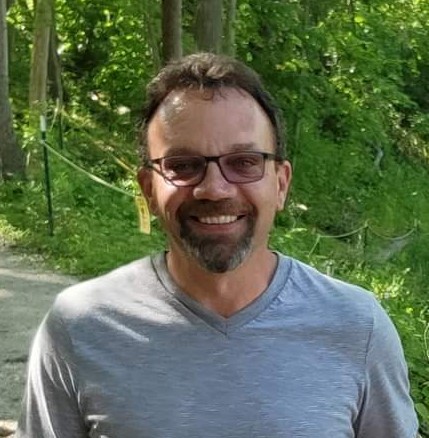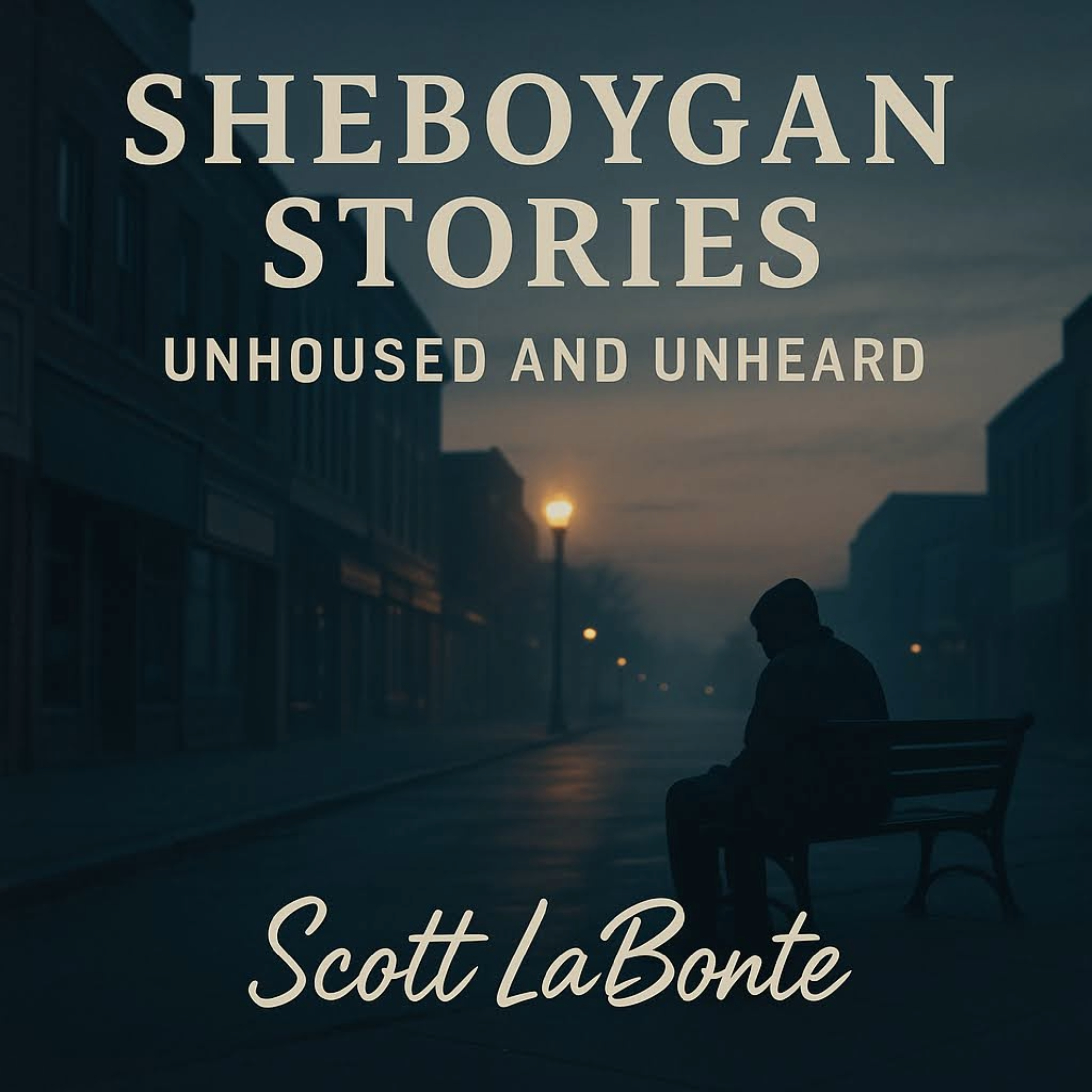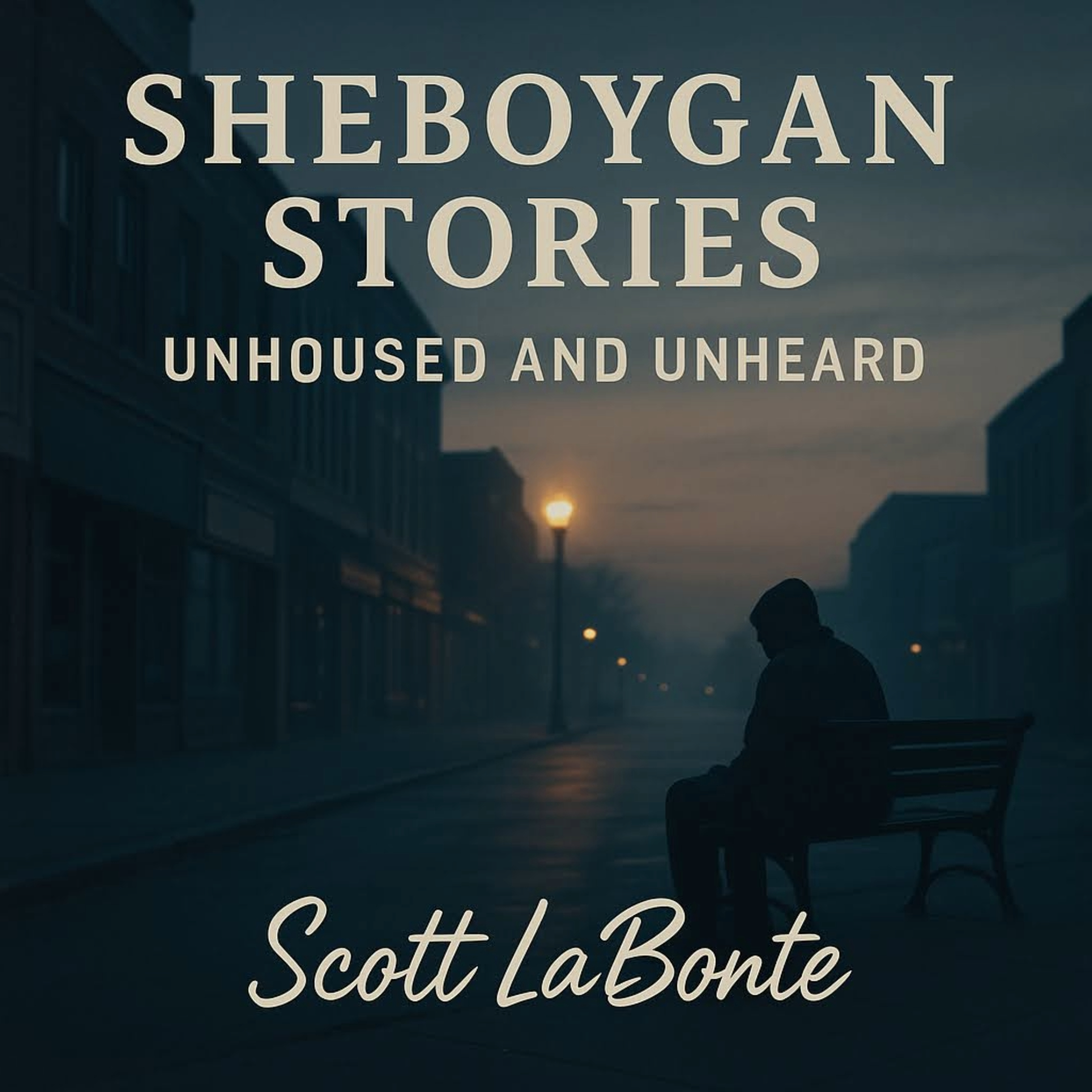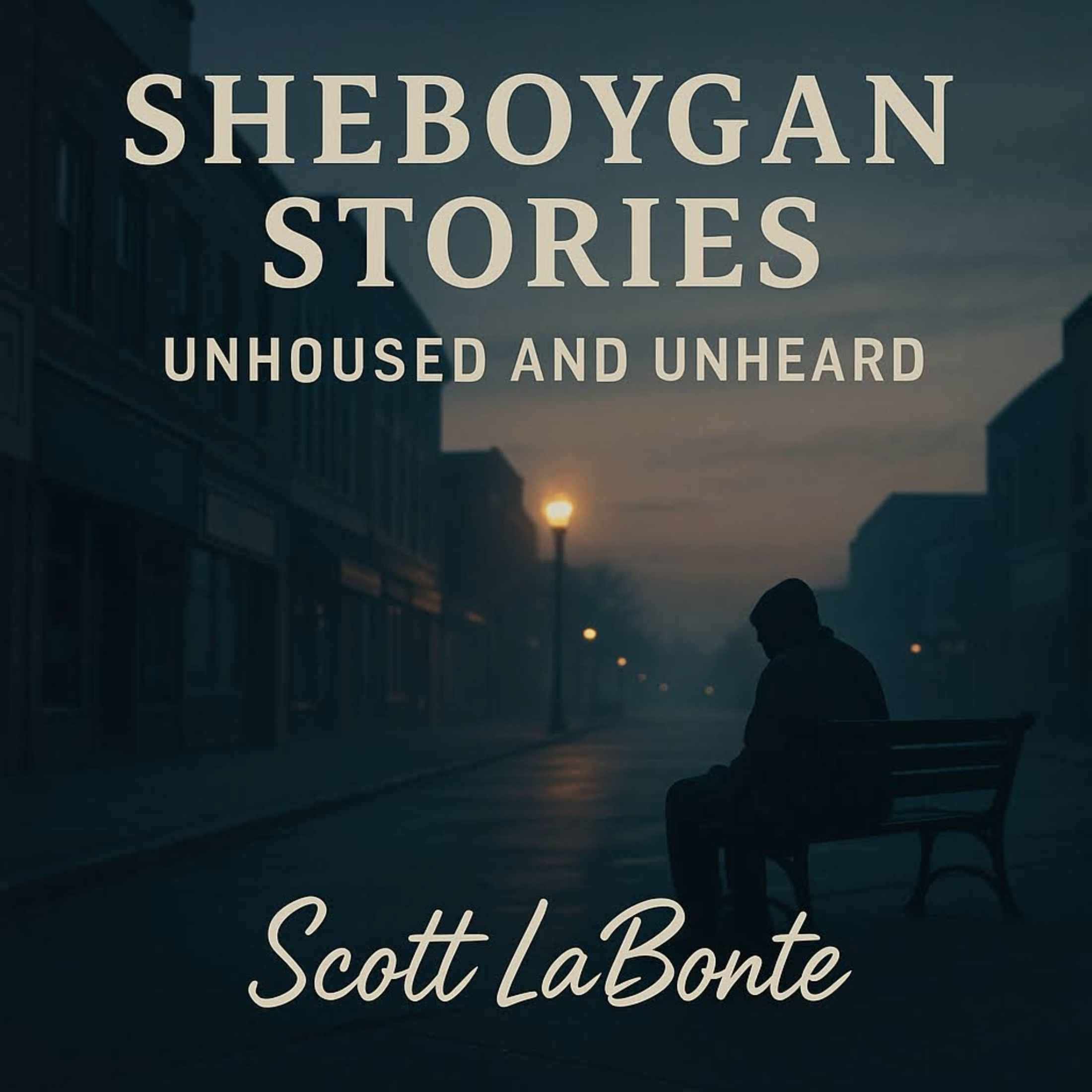Episode Transcript
[00:00:00] Speaker A: Foreign.
[00:00:23] Speaker B: Hey, everyone. Welcome back to Sheboygan Stories on how's an unheard where we get real about homelessness, community and what it means to survive when the world stops seeing you. I'm Scott LaBonte and I run Sheboygan Area Pay It Forward with my wife Kathleen. We work with people who are unhoused, struggling, surviving, and still human.
This podcast is about giving them the mic. No filters, no pity, just truth. It's about real people, real struggle and real strength.
Today I'm talking with Jimmy. He's been through hell. He's still standing, and he's got something to say. So let's go.
Today's episode is called Still Here. Because sometimes just surviving, just waking up, showing up, breathing is resistance. It's proof that despite the broken systems, the judgment, the cold nights and the closed doors, you're still here. And that matters.
First off, thanks for be willing to sit down and talk with me. I know sometimes isn't easy.
Can you start by telling us how did you end up here?
What's your story, in your own words?
[00:01:25] Speaker A: My sister had.
I had moved in with my sister. She just had four kids, four babies, and none of the fathers had stuck around, so she was terrified. And I had told her that she wouldn't have to do it alone, being abandoned all by herself.
So I ended up moving in with her.
She, as an agreement, I was doing all the childcare so she wasn't having to pay, you know, for daycare, and she was paying the rent while I was living there. Well, we both became addicts and long story short, ended up losing a lot, including custody of the children, and ended up evicted. Out on the street with my parents, being elder in age wasn't an option. To be able to go back and to be able to go back and be able to have a house to sleep in. So I ended up out on the street here with no job, which I was doing childcare for four years. So that's how I ended up homeless.
[00:02:43] Speaker B: And when was that that you ended up out on the street?
[00:02:46] Speaker A: When was it? Yeah, last November or. No, a couple Novembers ago.
It was.
It was November, the second week of November.
I was out here.
No, never, never homeless before. Not knowing what to do, no one to turn to.
All my friends I had pissed away with addiction.
Family the same.
No, no.
Barely any clothes on my back, no blankets, no anything to cover up with.
And with how cold it gets here and terrified on my own, absolutely.
[00:03:31] Speaker B: November's a terrible time to be put out on the streets.
[00:03:33] Speaker A: Yes, it is.
[00:03:35] Speaker B: Holy jeez.
Was there a moment that you realized that this is really happening, that you were in survival mode?
[00:03:49] Speaker A: I Forgot my answer.
Yeah.
1. Just sitting there freezing with nowhere to turn.
It kind of. Let's run it all sinking.
A lot of it had been ignored. A lot of it. There's only so much addiction can cover up, you know, and before you. You realize the situation that I put. That I put myself in, I had begged, you know, just even acquaintances and for places to stay, for even to be able to stay out in their cars, you know, unheated cars, because it was better than the elements. And just sitting there at. I just remember at the bus stop, it was the most terrifying experience of my life. And I had no one to blame but myself.
And it was. With nowhere to turn, it was just not knowing what to do, you know, even how to go about the process, you know, it was just terrifying.
[00:04:57] Speaker B: Right.
And I suppose with just being pretty much tossed out on the street, you didn't really know a whole lot of people or what to expect.
[00:05:06] Speaker A: No. Never had been homeless in my life in 40 years.
[00:05:10] Speaker B: Jeez. So, okay, so you've been out on the streets for a little while.
What does a normal, I guess if you'd say normal day look like for you right now?
[00:05:21] Speaker A: I get up at about 3:30 every morning. I'm in outpatient treatment. I currently still am in outpatient treatment. I've been clean and sober for over a year.
I go there. I do go to my meetings for the day. It's a daily thing.
Then I get off and I just worry about where I'm gonna get my, you know, first break, my breakfast and where I can start my day worrying about, you know, just to be able to. Anywhere I can go to get out of the elements and that just daily thing, it's.
There wasn't a whole lot of options before pay it forward came along, which was why pay it forward was so tremendously helpful. You never had people that, you know, were willing to take the time out of their own schedule to make sure that, you know, people, homeless people had a place to go and to feel safe.
And that's what I just deal with on a daily basis. I would deal with having to maintain my sobriety. I deal with wanting to find employment, which isn't easy when you don't have a place to shower every day. You know, you don't have a place to, you know, go get a haircut, you know, or, you know, make yourself look presentable.
[00:06:50] Speaker B: Wow.
Most people walk past folks on the street without really seeing them, what's something that you wish that they would stop and understand.
[00:07:02] Speaker A: That it could, you know, easily, just as easily be, you know, them that we're people, you know, and we're not. It's not a disease, you know, it's right.
[00:07:12] Speaker B: You're not going to catch it.
[00:07:12] Speaker A: No, no, we're people, you know, you still have people that walk by and just give the look, you know, that you're not doing enough or that this is where I'm choosing to be and.
[00:07:27] Speaker B: It'S not right, you know, and that kind of brings me. We talked when Kathleen and I did the first episode a couple weeks ago, we had talked about, you know, and I may be way off base, but I gotta wonder, you know, Kathleen had mentioned about.
Most people are one crisis away from being in the same predicament.
And I know, like myself, somebody else's crisis would probably have to be much bigger than mine.
And I think that scares them, you know, I think knowing that they're like this close to being in that same predicament, being in your shoes just scares the hell out of them. So they don't know how to act, how to. How to.
I don't know, maybe I'm wrong. Maybe I'm just grasping at straws here.
[00:08:08] Speaker A: No, and it's.
It took a while still on a daily basis, you know, I have not gotten used to the be sleeping out here and that it's just every day to have to worry about where you're gonna lay your head next and worry about if you're gonna be able to stay warm, you know, enough. Which more times than not, you end up, you know, being out in the elements. It's. You're. You're cold, you're uncomfortable, you don't sleep. You on top of everything else, you know, and then it just makes every single day that much harder, you know, and it's.
[00:08:45] Speaker B: Right.
Unfortunately. I've heard a lot, you know, especially through like running Pay it Forward and some of the people that I run into out on the streets or in the grocery store, Walmart, whatever else, you know, I hear people say, well, why don't they just get a job? Why don't they just do this?
And you know, I don't think they quite grasp or they quite understand. How do you.
That's not even on the scope of your radar, you know, that, that, that's not. Even if your basic needs aren't being met, how. How do you worry about.
[00:09:18] Speaker A: It falls so far down the priority list. It does, you know, I mean, Just having the little things to be challenged, as I was not used to and still not used to. I don't think I'll ever be used to it. It's hard and it's.
It. It makes being able just to, you know, go in and put in 40 hours a week, which most people think, it's not that big of a deal. It doesn't seem like that big of a deal.
It seems astronomical, you know.
[00:09:44] Speaker B: Right. Well, like, you know, you mentioned sleeping, you know, trying to sleep through the night. It's cold, you get disturbed.
How do you even think about or worry about a potential job if you don't know where you're going to sleep at night? You don't know, like, if you wake up, okay, where am I going to get something to eat? Where am I going to. What's going to happen to me today?
Or heaven forbid, where do I go to use the bathroom?
[00:10:09] Speaker A: Right.
[00:10:09] Speaker B: Something that we take for granted.
[00:10:11] Speaker A: Yeah.
[00:10:11] Speaker B: You know, that 99% of the people take for granted.
[00:10:15] Speaker A: I have to walk a few blocks just to use the bathroom every time. You know, I mean, it's just.
It's crazy. On how horribly difficult life. How more difficult it becomes. I never realized how bad and how horrible that people living on the street have it.
[00:10:37] Speaker B: Right.
I don't think most people do, you know, I think they see you and unfortunately, some people, they look away, they see a problem.
Right.
Oh, man. But through all of this, you're still here.
What keeps you going?
[00:10:59] Speaker A: Knowing one day that I'm.
Get out, everything will be okay, you know, I.
The progress, you know, that I'll make. I'll be able to go home to a nice warm apartment every night. That's what keeps me going in the worst times, the coldest, you know, the times that seems the most despair. It's just. That's the. The dream I hold on to, is that I can have a place to call myself my own, you know, and just be able to live somewhat of a normal existence, I guess. You know, and it's not. Have to worry about where I'm gonna sleep every night or eat or whether I'd be bothered or whether I'm gonna be kept up all night or, you know, addicts or drunks or, you know, just being bothered by every person walking past, you know, I mean.
[00:11:52] Speaker B: Or even like the sounds of the stuff that goes on at night, you know, that most people probably don't even realize until you're out here trying to get some sleep, you know, I think at one point, I think it was earlier in the fall, before the warming center had opened, I think it was you and I had talked and I'd asked about how do you sleep at night when it's cold, you know, because the warming center doesn't open until a little bit later in the season. And this is Wisconsin, it gets cold at night early.
And if I remember correctly, I think you had mentioned something about you go to the point where your body just basically shuts down, like physically, and then you get 10 minutes or so of sleep.
[00:12:36] Speaker A: It's impossible.
It seems like you're thankful for that 10 minutes.
It's. It's weird. It's a strange thing. It's that it really, once you go through this, it just makes you really appreciate, I guess, how good I, I had it, you know, I know most people do have it.
It's.
You just sit there and you're, you're shivering and you're, you're in such a hole and you're just closing your eyes and you're just begging to fall asleep, you know, and it's, your feet are freezing, your fingers are frozen. You're trying to make, you know, cover up. Just trying to get yourself warm enough where your body will just allow you to escape that misery.
[00:13:29] Speaker B: I don't think people realize that, how difficult that can be.
What's something that you're proud of that.
[00:13:37] Speaker A: Maybe nobody sees the fact that I am. I found out that I'm just a lot.
I am very strong hearted. I guess I always, I never gave myself enough credit for what I'm going through and the fact that I'm coming through and you know, that I haven't fallen back into addiction, that I haven't given up, that I'm soldiering on is so far is so much more than I thought it was capable of.
[00:14:15] Speaker B: That's something to be proud of.
[00:14:16] Speaker A: It is.
[00:14:16] Speaker B: I'm super proud of you for that.
[00:14:18] Speaker A: Thank you.
[00:14:22] Speaker B: You kind of touched on this a little bit earlier, but what's something that you dream about if there was nothing in your way?
[00:14:29] Speaker A: Justin? I've always wanted to go to Vegas and play poker. It's a World Series, just a poker, just being a professional player. And I've always been somewhat good at it, so I've always just been able, just wanted to go and just take a couple of weeks and go down there and just see, you know, be able to hopefully put myself in a lot better financial situation for one, for 289 and just, you know, just being able to live a life that doesn't include a struggle Every day.
[00:14:58] Speaker B: Right.
Oh, so if someone listening right now is struggling the way that you have, what would you want to tell them?
[00:15:10] Speaker A: Give them a break, you know, give them a smile. You know, they're.
They're not, they don't. They're not deceased, you know, we're not.
We're people, you know, just like everyone else. We have feelings. It hurts, you know, when we get the looks or the comments, you know, or the, the brush offs or the giggles, you know, I mean.
[00:15:31] Speaker B: Right. Or they cross the street so they're not. Don't have to walk past you on the street.
[00:15:35] Speaker A: Yeah. Because they're worried that you can ask them or something. Wow. Yeah.
[00:15:40] Speaker B: Just a. Just simple hello, look you in the eye, you know, picture like a person. Absolutely.
What barriers have you run into when trying to make changes?
[00:15:55] Speaker A: Just being able to keep myself presentable, you know, just being able to be able to go into a business and say, would I hire this person? When I look at myself in the mirror, you know, and just everything that entails and that, you know, everybody, I think it just takes for granted after a while.
And it's not.
I. I don't want to be pitied. I don't want to. I'm not asking to be or to be given anything, but I just do want to be given an equal chance and, you know, just be treated like.
[00:16:27] Speaker B: Everybody else and treated with dignity.
[00:16:28] Speaker A: And dignity. Absolutely.
[00:16:30] Speaker B: Absolutely. And you deserve that. Everybody out here deserves that.
[00:16:33] Speaker A: Yes, they do. Yes.
[00:16:34] Speaker B: You know, and it kind of.
I had mentioned in the last episode, so many people have asked me why we do what we do and why we continue to do what we do, and I don't hesitate to tell them for a second. Some of the most amazing people I've ever met in my entire life have been within the four walls of Pay it Forward.
Some of the stories, some of the just friendships that we've created within Pay It Forward.
[00:17:04] Speaker A: You guys have been absolutely amazing. Thank you.
[00:17:08] Speaker B: I think we need as much as you do.
I really do.
That's a lot to sit with after that.
Jimmy just didn't tell us a story. He trusted us with this truth, and for me, that hit hard.
Is there anything else you'd like to add before we wrap this up?
[00:17:31] Speaker A: Yeah, just, you know, like I said, just next time you run across somebody that's struggling, don't expect, don't.
Don't treat them like they're, you know, they're looking for a handout because more times than not, they just.
They just need somebody to treat them with some dignity, you know, dignity.
[00:17:51] Speaker B: And some respect.
[00:17:51] Speaker A: And some respect.
[00:17:53] Speaker B: Right. You know, nobody's gonna bite. Nobody's gonna, you know, it could be.
[00:17:57] Speaker A: You just as easily. It could.
[00:17:59] Speaker B: Absolutely. You know, it very easily.
You know, and like we've mentioned before, I think that part of it, that's what scares people.
And they know that. They know that they could end up right on side of you.
Wow.
I really, really appreciate you taking the time today to do this, to sit down and let your voice be heard.
You know, that's. That's the purpose of this podcast. We want people to hear our voices, and we want people to know that, you know, we are people and you matter.
[00:18:36] Speaker A: Thank you. Thank you for the opportunity.
[00:18:40] Speaker B: This has been Sheboygan stories, unhoused and unheard.
If you've ever felt invisible, forgotten, pushed aside, this podcast is for you.
And if you've never had to wonder where you'll sleep tonight, this podcast is especially for you. We're still here, and we're not done telling the truth. Thank you for listening.
If that moved you, don't let it end here. Share this. Talk to someone, volunteer, give someone your time or smile.
If you want to help, check out Sheboygan area. Pay it forward. You can find us on Facebook or @sheboyganerapayitforward.org and if you have a story, if you know someone who does, hit me up. This mic is for all of us.
Thank you for listening to Sheboygan stories unhoused and unheard. I'm Scott LaBonte. Until next time, stay kind, stay real, and remember, everyone's got a story.
Some just need someone to hear it.



